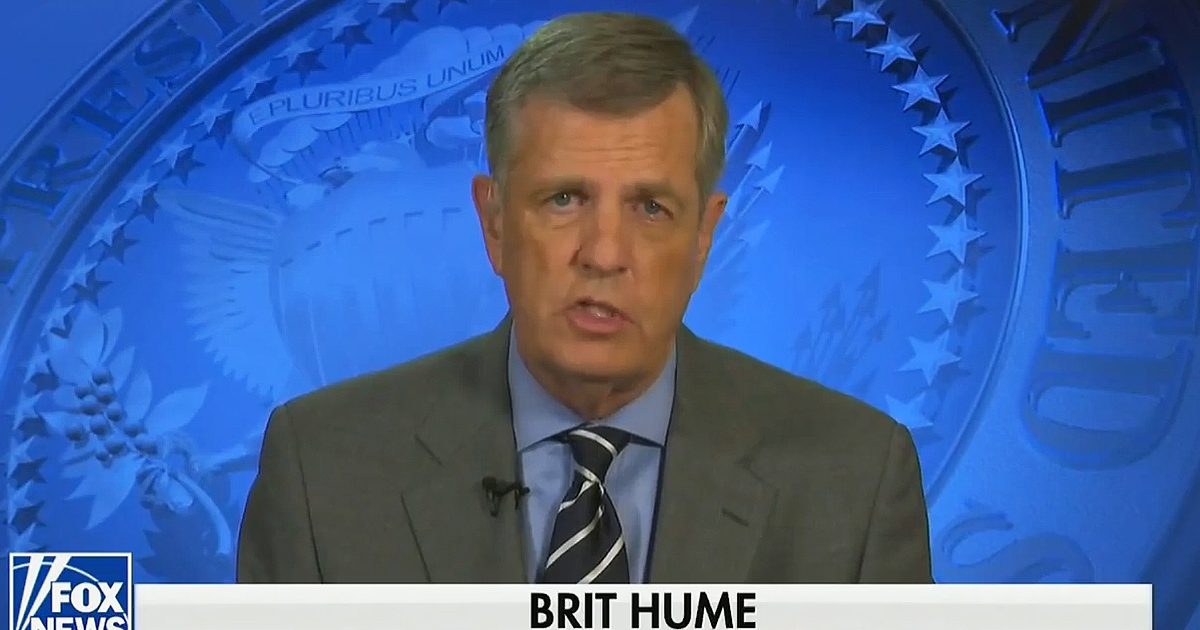Fox News’ Brit Hume Compares Trump Campaign Surveillance to FBI Spying on Martin Luther King

Fox News personality Brit Hume suggested that the only difference between the FBI’s surveillance of then-Trump campaign adviser Carter Page and J. Edgar Hoover‘s taping of Dr. Martin Luther King, Jr. is the media’s reaction to those events.
On Tuesday, Hume posted a tweet linking to a Wall Street Journal opinion column entitled “About the FBI’s Spying,” and subtitled “What’s the difference between surveillance of Carter Page and Martin Luther King?”
In the tweet, Hume commented “The only difference is the media called the King surveillance “spying,” and get the vapors when that word is used about Carter Page surveillance.”
The only difference is the media called the King surveillance “spying,” and get the vapors when that word is used about Carter Page surveillance —> What’s the difference between the FBI’s surveillance of Carter Page and Martin Luther King? asks @wjmcgurn https://t.co/7S2gWOdntH
— Brit Hume (@brithume) June 4, 2019
The FBI engaged in a covert campaign of surveillance against Dr. King that included sending him a blackmail tape and encouraging him to commit suicide.
Other Twitter users were quick to point out the obvious differences, such as the fact that Page surveillance was conducted with a warrant that had to be approved by a judge. Former federal prosecutor and CNN Legal Analyst Renato Mariotti was among those who schooled Hume:
One very important difference is that the wiretap of Martin Luther King was not authorized by a federal judge. The wiretap of Carter Page was authorized by a federal judge who reviewed evidence and concluded there is sufficient evidence to justify a wiretap.
— Renato Mariotti (@renato_mariotti) June 4, 2019
USA Today editor Brad Heath also contributed to Hume’s education:
Other notable differences include probable cause, a court order, not attempting to induce the target to commit suicide, etc. https://t.co/ksEecr525X
— Brad Heath (@bradheath) June 4, 2019
Another CNN legal analyst, Asha Rangappa, pointed out that it was the King spying that led to the creation of the court that authorized Page’s surveillance:
Well @brithume, as a result of the FBI spying on MLK, Congress passed a statute in 1978 called the Foreign Intelligence Surveillance Act which sets up a probable cause threshold which must be approved by a federal judge before surveillance can begin. Sooooo…big difference. https://t.co/tShMXouTr4
— Asha Rangappa (@AshaRangappa_) June 4, 2019
Legal experts often say you should never ask a question to which you don’t already know the answer, but in Hume’s case, perhaps he should also think about not answering such a question.
UPDATE: Now Hume says legal surveillance of Page was in some ways worse than spying on Dr. King:
And don’t even try to justify the Page spying by citing the FISA warrant obtained under highly dubious pretexts. In some ways, that makes it worse. The claim that Page was a foreign agent was absurd. And the reliance on the Steele dossier is just as bad.
— Brit Hume (@brithume) June 4, 2019





Comments
↓ Scroll down for comments ↓